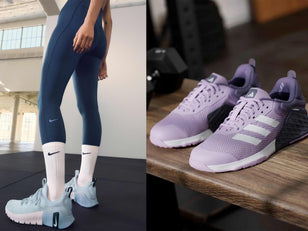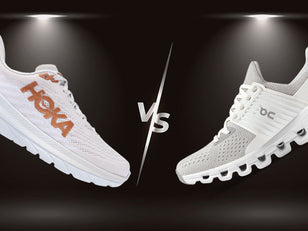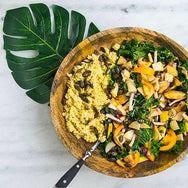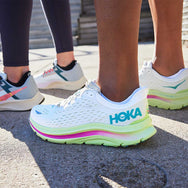
In a world increasingly obsessed with filters that make us look young and flawless, if an ingredient is touted as the scaffolding that holds your skin together and prevents the wrinkles it won’t be long before it trends. Hello #collagen. You can find it in creams, powders, supplements, protein bars and even in water! But what exactly is collagen and what are the benefits?
Consider this your ultimate science-based guide to collagen (Part 1). As we dive into the topic of collagen, this article will look into collagen biochemistry, its benefits and dietary sources. Our guide to collagen (Part 2, out in March) will explore supplementation of this popular ingredient in depth.
WHAT IS COLLAGEN?
Collagen is the most abundant protein in the body. Think of it like the stuff that “glues” your body together. You will find it in your bones, muscles, teeth, skin, tendons, cartilage, hair and nails, blood vessels and even the gut!
Structurally, collagen is made of predominantly three amino acids (the building blocks of protein). Glycine, proline and hydroxyproline. Chains of these amino acids (polypeptides) are coiled, twisted and crosslinked into a triple-helix configuration for additional strength. Collagen polypeptides are also attached to carbohydrate chains, which also make them glycoproteins. Glycoproteins help support our immune system, digestive system and reproductive systems.

WHAT ARE THE DIFFERENT TYPES OF COLLAGEN?
There are at least 16 types of collagen found in the body. The differences arise from different amino acids combinations and different attachments. However, the four main types of collagen are Type I, Type II, Type III and Type IV.
-
Type I: This type is the most abundant type of collagen (about 90%) and is found in almost every tissue in your body as it provides structure. It’s found in tendons, skin, bones, cartilage and connective tissues.
-
Type II: This type is made of more loosely packed fibres and is found mostly in elastic cartilage that cushions your joints.
-
Type III: This type supports the structure of muscles, organs and some connective tissues. IT is typically found alongside Type I collagen.
-
Type IV: This type helps with filtration and is found in the layers of your skin.
WHAT HAPPENS TO COLLAGEN WHEN WE AGE?
As we age, the production of collagen slows down and we also produce lower quality collagen. This process starts in our late 20’s and is probably most noticeable in our skin as fine lines and wrinkles begin to appear. Other noticeable signs of collagen degradation include less agile and achy joints ( as the cartilage degrades), brittle hair and nails, digestion issues and perhaps more pronounced cellulite.
Aside from ageing, a poor diet is the next probable reason for low collagen levels. If your body doesn’t have the necessary building blocks it is not able to make collagen. In addition, eating too many refined carbohydrates appears to interfere with collagen’s ability to repair itself. Just as the body can make collagen, it can also break down collagen from spending too much time in the sun (without sun protection) and smoking. Things like air pollution and stress are also detrimental to collagen degradation.

DIETARY COLLAGEN IN FOODS
Whole food sources of collagen come from meat, fish and eggs. If you chew the cartilage and tendons around the bones of chicken or beef you also get a whole whack of pure collagen. This is the reason why bone broths (made by simmering the collagen-rich parts of animal bones) are also known to be rich in collagen. Although plant-based diets may not contain the same mix and number of amino acids as found in meat-rich diets it is still possible to successfully create collagen using plant-based foods like legumes, beans, wholegrains and nuts.
Other nutrients also pay an important role in collagen formation and protect the body’s collagen stores from damage and deterioration. Vitamin C, zinc and copper are all necessary for proper collagen production. Your body makes procollagen by combining two amino acids, glycine and proline.
This process uses vitamin C. Large amounts of vitamin C are found in citrus fruits, berries and bell peppers. Zinc, another key nutrient, is found in collagenase, the enzyme which digests collagen in the gut before it gets used. A copper activated enzyme called lysyl oxidase is required for collagen maturation and thus why dietary copper is essential. Zinc rich foods include nuts, seeds, legumes, dairy and poultry and copper can be found in shiitake mushrooms, oysters, sesame seeds, lentils and dark chocolate.
Omega-3 fatty acids are also known to protect the body’s collagen stores from damage and work to help reduce inflammation. The best sources of omega-3’s are oily fish (mackerel, sardines and salmon) as well as walnuts, pumpkin, chia and hemp seeds or high-quality omega-3 supplements.

TAKE HOME MESSAGE
Collagen is a key nutrient that your body needs especially as you age. It is therefore important that you look to not only include collagen rich foods in your diet, but also to knock down all the other important supporting nutrients too. A supplement may also help but finding the right one and taking it at the correct time makes a big difference. Watch out for Part 2 of our collagen guide (out in March) to find out more…
References
- Inoue N et al. 2016. Ingestion of bioactive collagen hydrolysates enhance facial skin moisture and elasticity and reduce facial aging signs in a randomised double-blind placebo controlled clinical study. J Sci Food Agric, 96 (12): 4077-81
- XX 2014. Oral supplementation of specific collagen peptides has beneficial effects on human skin physiology: a double-blind, placebo-controlled study. Skin Pharmacol Physiol. 27 ( 1):47-55
- Schunk M. 2006. Dietary Supplementation with specific collagen peptides has a body mass index-dependent beneficial effect on cellulite morphology. Journal of Cosmetic Dermatology.
- Bello A et al. 2006. Collagen hydrolysate for the treatment of osteoarthritis and other join disorders: A review of the literature. Curr Med Res Opin; 22 (11) 2221-32
- Bischoff S. 2014. Intestinal permeability – a new target for disease prevention and therapy. BMC Gastroenterol. 14: 189
- Zdzieblik D. 2015. Collagen peptide supplementation in combination with resistance training improves body composition and increases muscle strength in elderly sarcopenic men: a randomised controlled trail. B J Nutr; 114 (8): 1237-45





























































